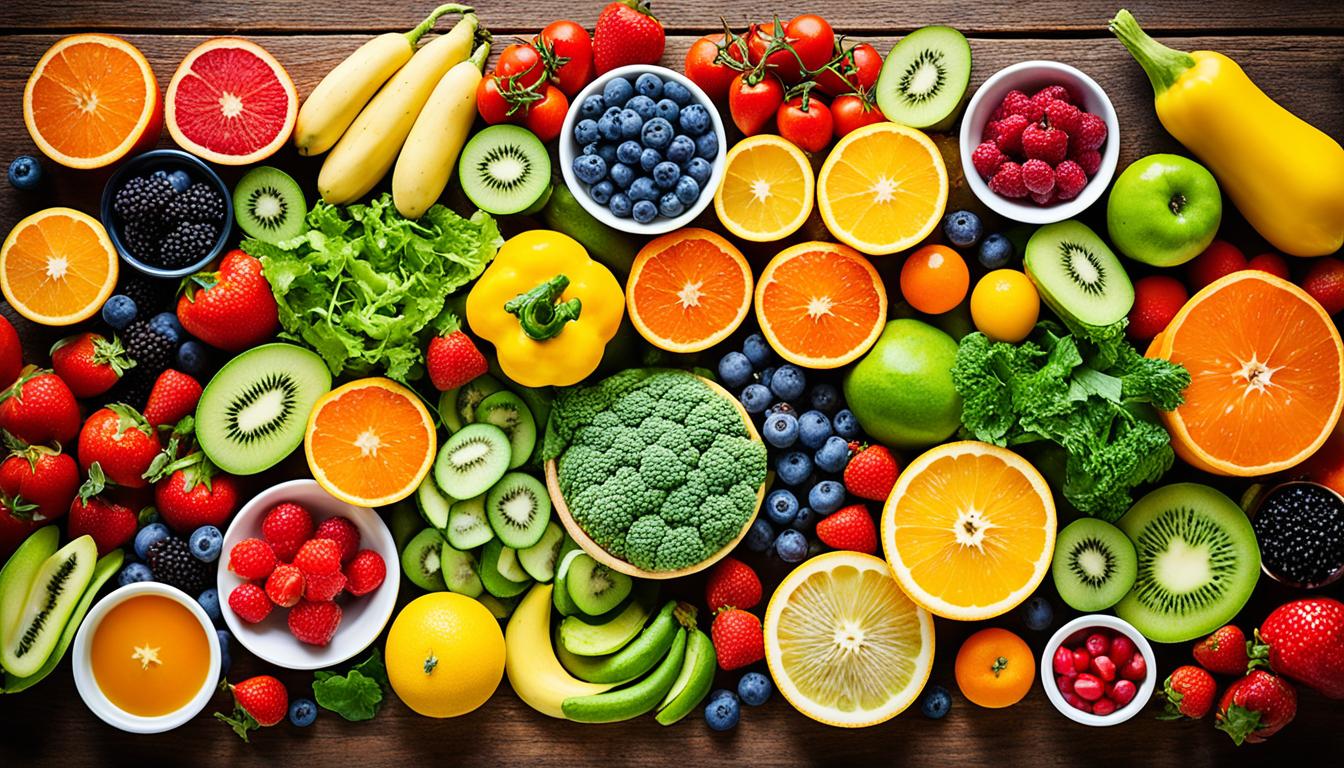Did you know that after 50, runners can lose muscle quickly? In fact, they might see a 10% drop every ten years. This fact highlights the need for good nutrition to keep up performance and health. As slower metabolism and higher endurance needs come into play, it’s vital for older runners to know about their special diet needs. This helps them keep running longer.
Nutrition for the senior runner isn’t just about counting calories or eating certain foods. It involves a detailed plan that takes into account how our bodies change with age. By changing their diet, older athletes can boost their muscle, energy, and recovery time. Making a diet plan that caters to their specific needs helps them stay both competitive and healthy.
For those over 50, focusing on what you eat is more than a good idea—it’s a must. Changing what you eat to get the right nutrients and energy can make a big difference. By sticking to these healthy eating habits, every run can feel better. Plus, it helps with long-term health and keeping up endurance.
Key Takeaways
- Aging runners can lose 10% muscle mass per decade, highlighting the importance of tailored nutrition.
- Well-planned diets can enhance performance by adjusting to changes in metabolism and muscle mass.
- Personalized nutrition can support energy levels, recovery, and overall health for senior runners.
- Focus on balanced macronutrient intake to accommodate the body’s evolving needs.
- Consistent nutrition habits promote long-term vitality and improved endurance for runners over 50.
Understanding the Aging Runner’s Body
Aging changes a runner’s body, especially after 50. Performance and health can be greatly affected. It’s important for older runners to know and adjust to these changes.
The Impact of Aging on Metabolism and Muscle Mass
For aging athletes, metabolism slows down. This affects muscle mass. Known as sarcopenia, it needs a smart plan for diet and exercise.
Older runners should eat more protein. They should match it to their weight and how active they are. This helps fight muscle loss.
- Support muscle mass with protein-rich meals
- Incorporate resistance training to stimulate muscle growth
- Monitor and adjust carbohydrate intake to manage altered metabolism
Hydration Considerations for Older Athletes
Older runners must think differently about hydration. They might not feel thirsty as much. Drinking enough water keeps performance up and avoids dehydration risks.
| Hydration Tips | Benefits |
|---|---|
| Drink water regularly throughout the day | Prevents dehydration |
| Include electrolytes in your fluid intake | Maintains electrolyte balance |
| Monitor urine color to gauge hydration levels | Ensures adequate hydration |
Key Nutrients for Optimal Performance
Eating right is essential for older runners. Let’s talk about the important nutrients that help boost performance. These nutrients also keep us healthy as we get older.
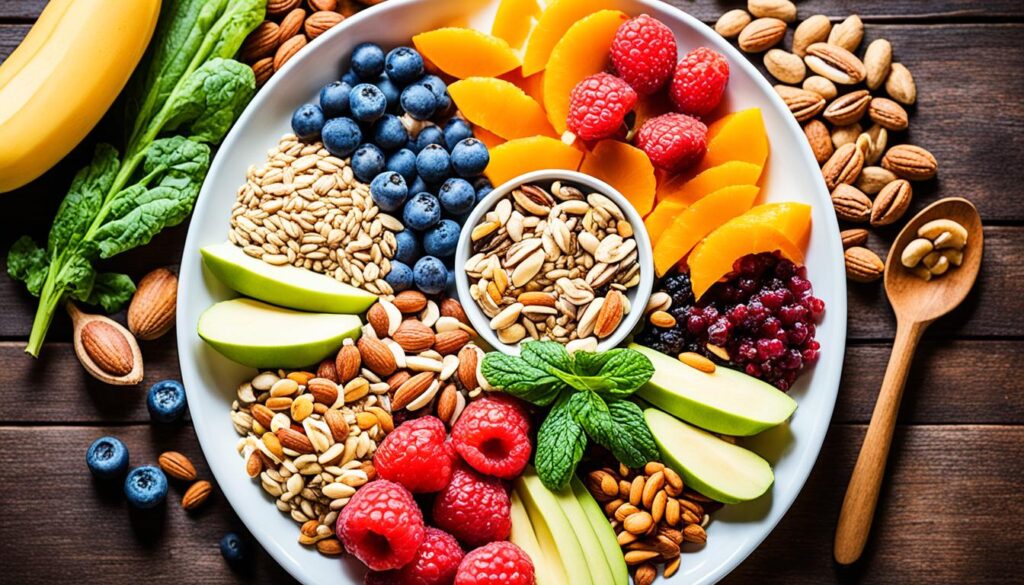
Proteins: The Building Blocks for Muscle Maintenance
Our need for protein increases as we age. It helps keep muscles strong and fixes tissues after working out. To help with muscle health, try eating these protein-packed foods:
- Lean meats like chicken and turkey
- Fish, such as salmon and tuna
- Plant-based proteins like lentils, beans, and tofu
- Low-fat dairy products such as yogurt and milk
- Nuts and seeds
Carbohydrates: Fuel for Endurance
Carbs give us the energy we need for long runs. They are our main source of fuel during exercise. Older athletes should eat good carbs to keep their energy up. Here are some great sources:
- Whole grains like oats, quinoa, and brown rice
- Fruits such as bananas, apples, and berries
- Vegetables, especially ones like sweet potatoes and leafy greens
- Legumes, including chickpeas and black beans
Focusing on these nutrients will help older runners boost their staying power. They can maintain muscle better and feel more energized for their workouts.
Fats: Essential for Long-Term Energy and Joint Health
For older runners, healthy fats are key for long-term energy and joint health. Not all fats harm us. In fact, choosing the right fats can boost performance and well-being.
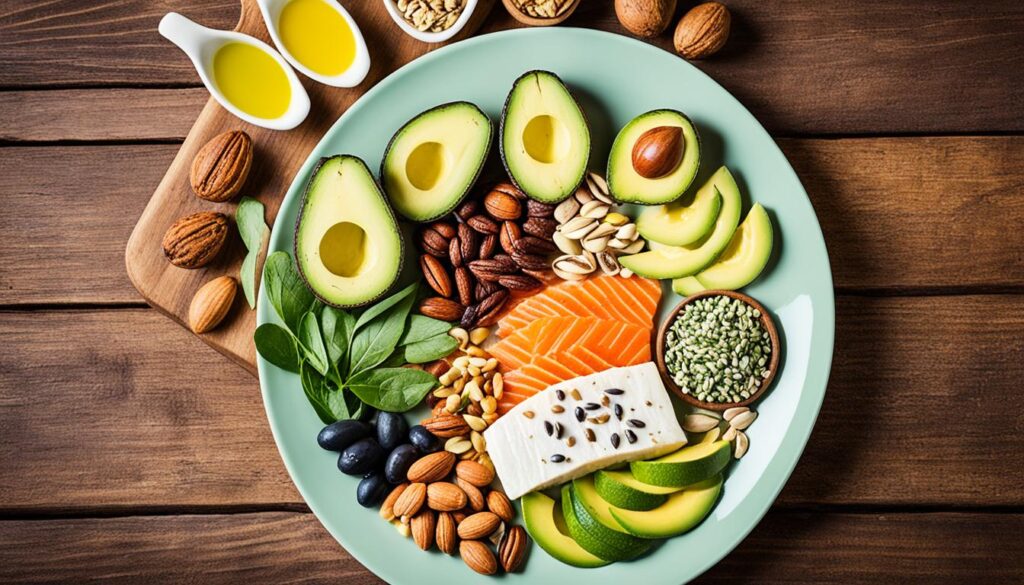
Healthy fats, like monounsaturated and polyunsaturated fats, cut down inflammation. This problem often affects aging joints. Foods such as avocados, nuts, and fatty fish are great sources.
They contain omega-3 fatty acids. This helps older runners by upping their energy and making joints more flexible and comfortable.
| Fat Type | Benefits | Sources |
|---|---|---|
| Monounsaturated Fats | Reduce inflammation, support heart health | Olive oil, avocados, nuts |
| Polyunsaturated Fats | Essential for brain function, reduce joint pain | Fatty fish, flaxseeds, walnuts |
| Omega-3 Fatty Acids | Enhance joint mobility, support cardiovascular health | Salmon, chia seeds, fish oil supplements |
By adding the right amount of these fats, older runners stay energetic during long runs. They also protect their joints. This nutrition plan overall helps maintain health. It lets them continue running with less pain and more energy.
Vitamins and Minerals: Supporting Overall Health
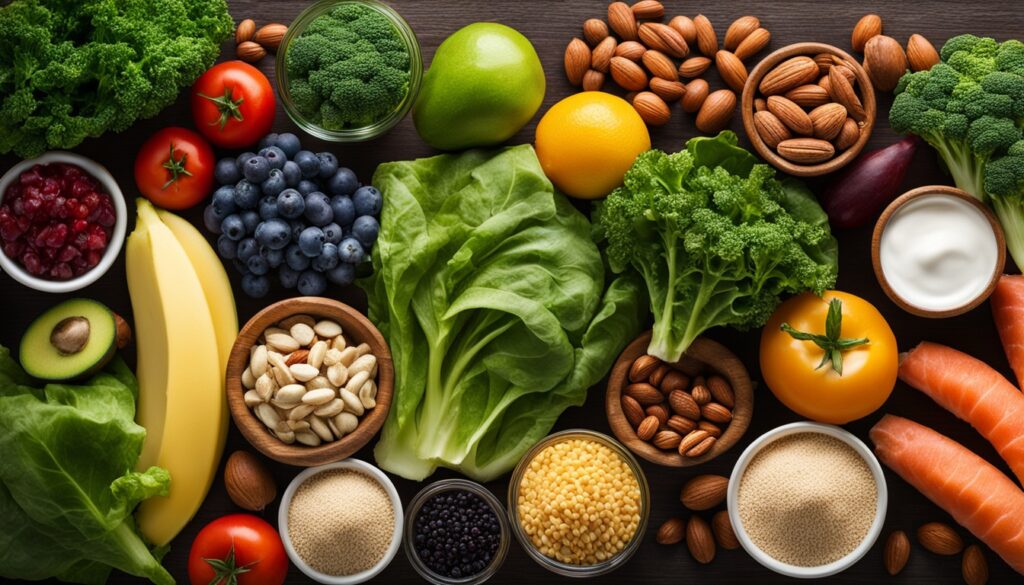
Runners over 50 need a diet full of important nutrients to stay fit. Eating enough protein for muscle repair helps keep muscles strong and aids recovery. Protein is key for fixing muscle damage from hard workouts.
Carbs also play a big part in a healthy diet for older runners. They give the energy needed for long runs. Eating whole grains, fruits, and veggies helps release energy slowly.
Proteins: They’re vital for keeping muscles strong and big.
Carbohydrates: They help keep energy up and improve endurance.
Fats: They’re important for energy and keeping joints healthy. Omega-3s are especially good.
Vitamins and Minerals: They’re crucial for strong bones. Calcium, vitamin D, and B vitamins help with energy and bone health.
For older runners, healthy fats like omega-3 fatty acids are key. They come from fish, nuts, and seeds. These fats help with joint health and long-term energy levels.
Getting enough vitamins and minerals for bones is critical, especially to fight against osteoporosis as we age. Calcium and vitamin D make bones strong. B vitamins boost energy and fight tiredness.
Older runners can boost their performance and recovery by eating well. A mix of proteins, carbs, healthy fats, and vitamins keeps them going, no matter their age.
Mastering Nutrition: Needs for the Older Runner
Creating a balanced diet is key for older runners to keep up their performance and health. They need to understand what their body requires. It helps to work with a nutritionist to make meal plans that fit their health and training.

Diet plans for senior runners should focus on important nutrients for their nutrition. A balanced meal plan includes:
| Meal Component | Importance | Recommended Sources |
|---|---|---|
| Proteins | Essential for muscle repair and maintenance | Lean meats, legumes, eggs, dairy |
| Carbohydrates | Crucial for energy and endurance | Whole grains, fruits, vegetables |
| Fats | Needed for long-term energy and joint health | Avocado, nuts, seeds, fish |
| Vitamins and Minerals | Support overall health and prevent deficiencies | Variety of fruits, vegetables, and fortified foods |
Putting these elements into a meal plan is crucial. Changing the plan based on how intense training is can meet nutritional needs well. This method helps keep performance high and supports overall health.
Senior Runner Meal Planning
Crafting a meal plan for senior runners involves careful thought. It’s about getting the right balance of macronutrients and timing meals well. This ensures they meet their nutritional needs to support exercise.
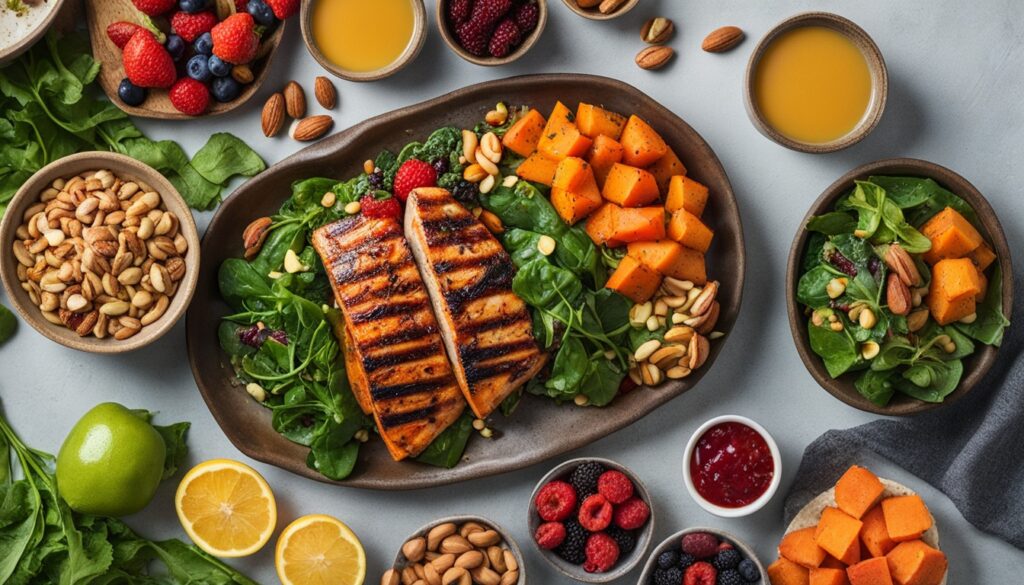
Creating Balanced Meals
A balanced meal includes proteins, carbohydrates, and healthy fats. Seniors need nutrient-rich foods for fuel. Include lean proteins, whole grains, and fresh produce to boost energy and help with recovery.
The Importance of Meal Timing
Meal timing is key for athletes. Eating the right food at the right time boosts energy and recovery. A hearty breakfast starts the metabolism. Then, timely snacks before and after workouts support energy and muscle repair.
Adjusting Plans for Training Intensity
Adjusting nutrition with training intensity is vital. Increase carbs during heavy training for energy. During lighter activity periods, reduce intake to stay balanced.
| Time of Day | Meal/Snack | Key Components |
|---|---|---|
| Morning | Breakfast | Whole grains, lean protein, fresh fruit |
| Pre-Workout | Snack | Carbohydrates, small amount of protein |
| Post-Workout | Snack | Protein, healthy fats, hydration |
| Evening | Dinner | Lean protein, vegetables, complex carbohydrates |
Hydration Strategies for Senior Runners
Staying hydrated is key for senior runners, especially as we age and might not feel as thirsty. Getting it right helps maintain top performance and overall health. Here are steps to integrate hydration into your daily and training habits.

First, understand dehydration signs and act to avoid it. Senior runners should sip fluids all day, not just when exercising. Water is best, but other high-water content foods and drinks help too.
Keep an eye on your fluid intake during long runs. Have a water bottle handy and drink little but often. The color of your urine is a good hydration indicator; light yellow is what you’re aiming for.
Electrolytes are crucial for senior athletes, helping manage fluid balance. They’re lost through sweat, so sports drinks can be helpful during longer or harder workouts.
Here’s a simple hydration plan:
| Time of Day | Fluid Intake Recommendation |
|---|---|
| Morning | Start with a glass of water and keep drinking in the morning. |
| Before Exercise | Have 16-20 ounces of water 2-3 hours before working out. |
| During Exercise | Drink 7-10 ounces of water every 10-20 minutes while exercising. |
| After Exercise | Post-workout, drink 16-24 ounces of water for each pound lost. |
| Evening | Drink water through the evening to hit 8-10 cups by bedtime. |
Following these steps and watching your intake makes hydration easy. It benefits your endurance and recovery, keeping you active and well.
Nutrition Tips for Mature Runners
For aging runners, it’s key to control appetite and keep digestion healthy. We have tips and advice here for older athletes. These suggestions help them stay on top of their game.
Overcoming Decreased Appetite
For older athletes, eating enough can be tough. To keep up appetite, add foods rich in nutrients but small in size. Try healthy fats like avocados and nuts for extra calories. A mix of carbs, proteins, and fats in meals boosts energy and endurance.
- Small, frequent meals: Eating little and often helps meet nutrition needs.
- Protein-rich snacks: Greek yogurt or cheese can save muscle.
- Smart supplementation: Use supplements like vitamin D and calcium for any missing nutrients.
Digestive Health: Foods That Promote Comfort
Good digestion matters a lot for mature runners to feel great. Add foods that help digestion and avoid those that don’t.
- High-fiber foods: Eat many whole grains, veggies, and fruits to help with digestion and avoid constipation.
- Probiotics: Try yogurt, kefir, and fermented veggies for a happy gut.
- Hydration: Drinking plenty keeps digestion smooth and prevents getting dehydrated.
| Food | Benefit | Example |
|---|---|---|
| Whole Grains | High in Fiber | Oatmeal, Brown Rice |
| Fermented Foods | Promotes Healthy Gut | Yogurt, Kimchi |
| Leafy Greens | Rich in Nutrients | Spinach, Kale |
By following these nutrition tips for mature runners and focusing on digestive health, older athletes can manage their diets well. This supports their active lifestyles and helps them perform well for longer.
Common Nutritional Challenges and Solutions
Older runners face unique nutritional issues. These issues can affect their health and running performance. Understanding and addressing these problems quickly is key to keep a well-balanced diet that suits their active life.
Addressing Nutrient Deficiencies
As people age, absorbing essential nutrients gets harder. Vitamins like B12 and D, along with calcium and magnesium, are very important. They help with bone strength, making energy, and muscle work. Eating foods full of nutrients, like green veggies, fish, dairy, and cereals with added vitamins, is a good move.
- Increase intake of B12 through lean meats, fish, and dairy.
- Supplement vitamin D with outdoor activities and fortified foods.
- Ensure adequate calcium by including dairy, almonds, and green vegetables.
Dealing with Food Sensitivities and Allergies
Many older runners have food sensitivities or allergies. This means they must change what they eat. It’s important to know and avoid foods that cause bad reactions. Foods like gluten, lactose, and some nuts might upset the stomach or cause allergies.
- Substitute lactose with plant-based milk alternatives like almond or soy milk.
- Opt for gluten-free grains such as quinoa, rice, and buckwheat.
- Choose alternative protein sources like legumes, seeds, and lean meats.
By making these changes, older runners can keep their diet balanced. This lets them keep enjoying their running without health risks.
Research-Based Nutrition Advice for Aging Athletes
Aging athletes should use research to guide their nutrition. This helps keep their performance high and health strong. Working with nutritionists is great for coming up with diets just for them, considering their needs as older runners.
Benefits of Consultations with Nutritionists
Nutritionists give advice that fits the athlete’s life perfectly. They look at the athlete’s health, how much they train, and their way of living. This can lead to better performance, faster recovery, and fewer health problems as they age.
Meeting with a nutritionist means getting the newest tips based on real science. They can help make a diet that keeps muscles strong and metabolism quick, which is very important for older athletes.
Evidence-Based Studies and Their Implications
New studies keep showing us how nutrition affects aging athletes. They’ve found that more protein, omega-3s for the joints, and the right vitamins make a big difference. It’s also key to eat at the right times to get the most from your food.
Recent findings in the “American Journal of Clinical Nutrition” talk about the power of protein. Older athletes eating more protein kept their muscle strength up. This shows how crucial good nutrition habits are every day.
Using science-backed eating tips does more than boost performance. It also keeps athletes healthy for a long time. It’s very important for older athletes to know the newest nutrition strategies. This way, they can do their best in sports and life.
Conclusion
In wrapping up, we want to stress how crucial good nutrition is for older athletes. It’s vital for keeping up health and performance for life. Adjusting what they eat to address aging-related changes helps a lot. By choosing foods rich in nutrients and following solid nutritional guidelines, these athletes can keep their muscles strong, boost metabolism, and stay well-hydrated.
A balanced diet, filled with vital vitamins and minerals, boosts endurance and long-term success. Facing issues like less hunger or food sensitivities becomes easier with smaller, richer meals. Also, getting advice from diet experts can help a lot.
To keep up their game, older athletes must stay updated and eager. They need to fine-tune their eating plans as their bodies change and be proactive about their health. With the correct food choices and determination, they can keep enjoying running and reach their goals.

